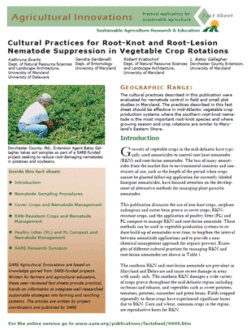This publication discusses the use of non-host crops, sorghum sudangrass and castor bean grown as cover crops, RKN-resistant crops, and the application of poultry litter (PL) and PL compost to manage RKN and root-lesion nematode. These methods can be used in vegetable production systems to reduce build-up of nematodes over time, to lengthen the interval between nematicide applications and to provide a non-chemical management approach for organic growers.
Geographic Adaptability: The cultural practices described in this publication were evaluated for nematode control in field and small plot studies in Maryland. The practices described in this fact sheet should be effective in mid-Atlantic vegetable crop production systems where the southern root-knot nematode is the most important root-knot species and where growing season and crop rotations are similar to Maryland’s Eastern Shore.
Want more information? See the related SARE grant:
